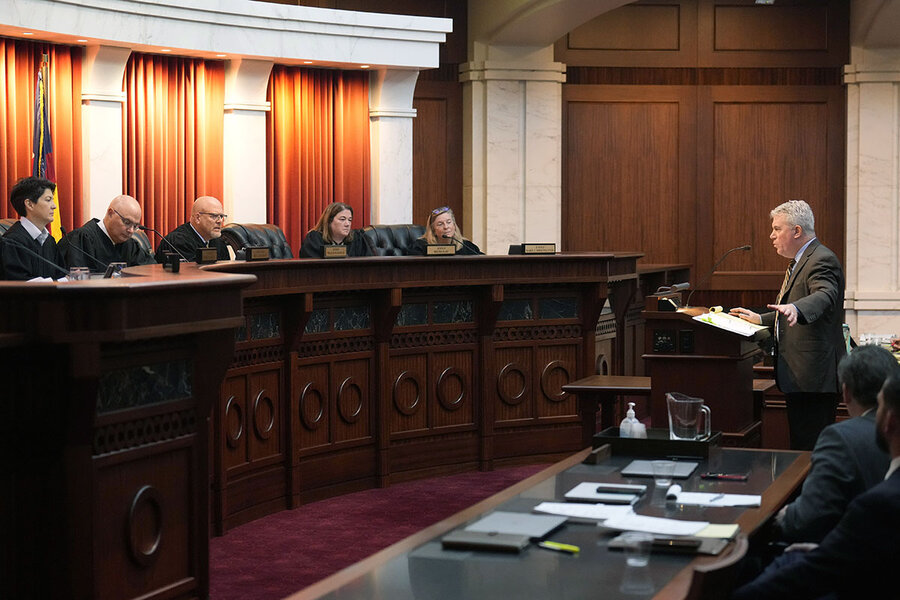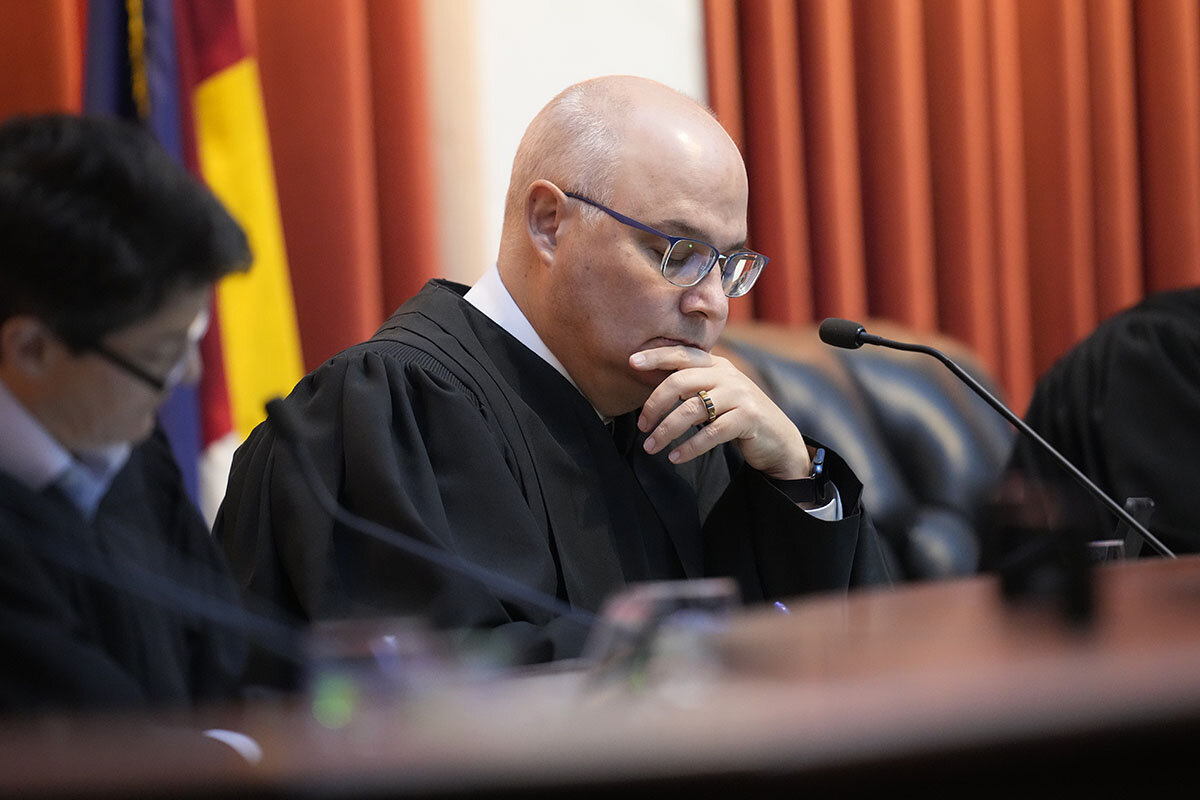Colorado stunner: Ballot ruling against Trump could aid him
Loading...
The Colorado Supreme Court may have just put a big gift under Donald Trump’s Christmas tree.
In fact, the court’s blockbuster 4-3 ruling Tuesday disqualifying the former president from Colorado’s Republican primary ballot presents him with multiple gifts: It fuels his argument that a politicized American legal system is out to “get” him – and deprive voters of their choice of candidates. It has spurred even his fiercest GOP presidential primary foes to rush to his defense. And it deflects attention from the latest Trump controversy, rhetoric on immigrants that has summoned Hitler comparisons.
The Colorado high court ruled that former President Trump had engaged in “insurrection” and was therefore ineligible to become president again under the 14th Amendment to the U.S. Constitution. The decision, based on Mr. Trump’s apparent efforts to overturn the 2020 election, is on hold pending an expected emergency appeal to the U.S. Supreme Court.
Why We Wrote This
A Colorado court ruling barring Donald Trump from the state presidential primary ballot because of “insurrection” is reverberating nationwide. It raises unprecedented legal questions – and also comes as a political gift to the former president.
But the implications go far beyond Democratic-leaning Colorado, whose primary is March 5 and which is likely to vote Democratic anyway next November. Similar efforts to get Mr. Trump off the ballot in other states, including Arizona, Michigan, and New Hampshire, all general-election battlegrounds, could be more consequential if he is stricken from those ballots as well. National polls show Mr. Trump with an enormous lead for the GOP nomination and in a tight race with President Joe Biden in the general election.
The fresh turmoil around 2024 adds to an already fraught election season, featuring two older, unpopular men, and threatens to heighten concerns about the health of American democracy.
“It’s a stunning decision that will have legal and political consequences,” says Leonard Steinhorn, a professor of political communication and recent American history at American University.
The Colorado Supreme Court majority agreed with a lower court ruling that Mr. Trump had engaged in “insurrection,” but differed on whether Section 3 of the 14th Amendment – ratified after the Civil War – applied to the president. The lower court found that the president was not an “officer of the United States,” and therefore not subject to the provision that would bar him from holding federal office again.
The politics of the Colorado ruling are unavoidable and hint at a highly charged debate going forward. All seven members of the state’s high court were appointed by Democratic governors, but the ruling was 4-3. One dissenting justice, Carlos Samour, wrote that the decision to bar Mr. Trump from the ballot “flies in the face of due process doctrine,” given that he wasn’t convicted of insurrection in a criminal trial or a proceeding of similar thoroughness.
There are wider unanswered questions nationwide: How is “insurrection” legally defined, and must "insurrection" be proved in a court of law for a person to be barred from the ballot under the 14th Amendment?
Mr. Trump has not been charged with insurrection in any of his federal legal cases, including the one focused on his role in the Jan. 6, 2021, storming of the U.S. Capitol. In his second impeachment, over the Jan. 6 riot, Mr. Trump was charged with “incitement of insurrection” and acquitted. And of the 1,100 rioters prosecuted for their actions on Jan. 6, none were charged with insurrection.
The lower Colorado court finding that Mr. Trump contributed to an insurrection was “incredibly significant,” says Claire Finkelstein, professor of law and philosophy at the University of Pennsylvania Carey Law School.
“If I were a member of the [U.S.] Supreme Court, I would sort of feel that it was our duty to take the case, because it’s a critical question of enormous constitutional importance and dimensions,” says Professor Finkelstein.
For example, she says, the interpretation of the 14th Amendment, Section 3, “could come up with regard to members of Congress. It could come up with regard to former members of the administration, and so on. So it’s not just a Donald Trump problem.”
But for now, all eyes are on the Trump case – and what it means for the nomination race and next November. The latest New York Times/Siena poll, released Wednesday, shows that Mr. Trump’s legal woes have not hurt his standing among Republican voters, with 62% saying that if he wins the GOP nomination, he should keep it even if convicted of a federal crime. But the flip side is that nearly one-fourth of Republicans don’t want Mr. Trump as the nominee if he’s convicted – though the timing of the cases suggests the nomination will be set before any verdicts.
Over time, with each state and federal indictment since the first in March, Mr. Trump’s standing in Republican primary polls has edged upward. He wears his legal woes as a badge of honor, depicting himself as a proxy for his supporters and telling activists, “They’re coming after you.”
Following the news out of Colorado, the other GOP presidential candidates rushed to Mr. Trump’s defense. “The last thing we want is judges telling us who can and can’t be on the ballot,” former United Nations Ambassador Nikki Haley told reporters Tuesday night.
Another complicating factor is that time is short. The deadline to get on the Colorado ballot is Jan. 5. The state’s high court stayed its ruling until Jan. 4, saying that if Mr. Trump appeals to the U.S. Supreme Court, as expected, he would remain on the ballot.
Still, the Colorado case could inspire new ones, heightening the sense of uncertainty around a 2024 election already expected to be like no other.
Hans von Spakovsky, an election law expert at the conservative Heritage Foundation, called the ruling “badly judged, banana-republic election interference.”
Even Trump critics, such as former Trump White House lawyer Ty Cobb, predict the Colorado ruling will be overturned. “It could be 9-0 in the Supreme Court for Trump,” Mr. Cobb said on CNN Tuesday.
For Democrats, the Colorado ruling presents a mixed bag of political opportunity and peril: It furthers their narrative that Mr. Trump is an “insurrectionist” who threatens the very essence of American democracy. But if Mr. Trump somehow were not to be the GOP nominee, and Mr. Biden faced another of the top Republican candidates, he’d likely face a steeper climb toward reelection.
Speaking to reporters in Milwaukee Wednesday, Mr. Biden said it was “self-evident” that Mr. Trump is an “insurrectionist,” but added he’d leave it to the judiciary to decide if he should be excluded from the Colorado ballot.
Democrats will also have to reckon with the fact that “time often sands the edges” of historic events like Jan. 6, which shook the nation nearly three years ago, says Professor Steinhorn.
“There are a significant number of Republicans who may have been concerned about Jan. 6 when it was happening, and the immediate aftermath, but don’t seem as concerned now.”






